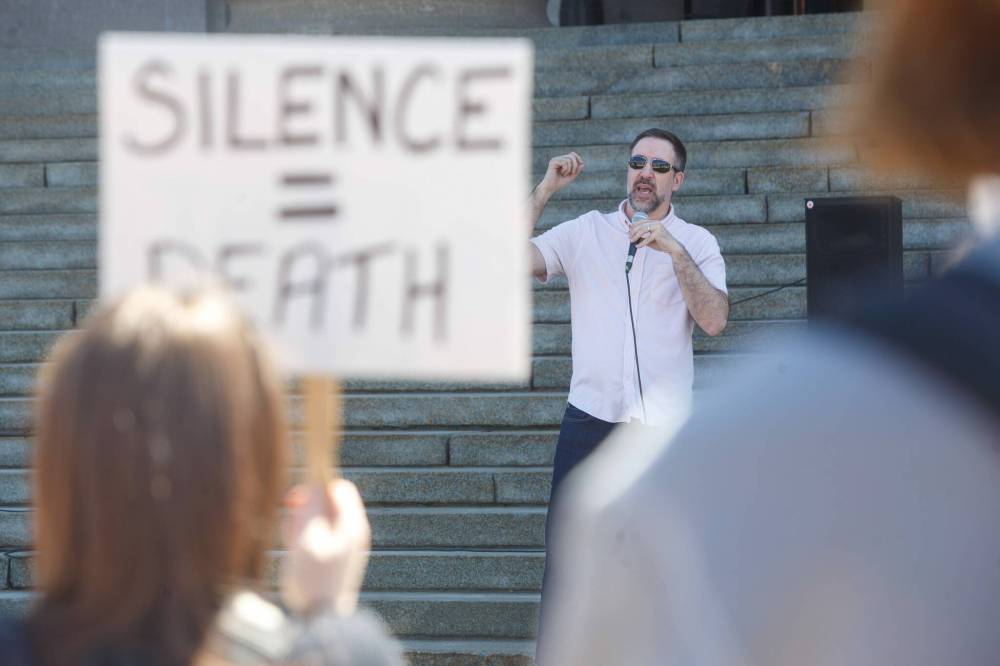‘There’s no treatment when someone dies’
Health coalition calls on province to reconsider supervised consumption sites as drug poisoning numbers surge
Advertisement
Read this article for free:
or
Already have an account? Log in here »
To continue reading, please subscribe:
Monthly Digital Subscription
$0 for the first 4 weeks*
- Enjoy unlimited reading on winnipegfreepress.com
- Read the E-Edition, our digital replica newspaper
- Access News Break, our award-winning app
- Play interactive puzzles
*No charge for 4 weeks then price increases to the regular rate of $19.00 plus GST every four weeks. Offer available to new and qualified returning subscribers only. Cancel any time.
Monthly Digital Subscription
$4.75/week*
- Enjoy unlimited reading on winnipegfreepress.com
- Read the E-Edition, our digital replica newspaper
- Access News Break, our award-winning app
- Play interactive puzzles
*Billed as $19 plus GST every four weeks. Cancel any time.
To continue reading, please subscribe:
Add Free Press access to your Brandon Sun subscription for only an additional
$1 for the first 4 weeks*
*Your next subscription payment will increase by $1.00 and you will be charged $16.99 plus GST for four weeks. After four weeks, your payment will increase to $23.99 plus GST every four weeks.
Read unlimited articles for free today:
or
Already have an account? Log in here »
Hey there, time traveller!
This article was published 19/07/2023 (856 days ago), so information in it may no longer be current.
A spike in drug-poisoning cases in Winnipeg has sparked renewed calls for the province to open safe consumption sites, as proponents argue the deepening crisis will only get worse without them.
In the first 16 days of July, the Winnipeg Fire Paramedic Service responded to 183 calls related to drug poisoning, averaging 11 calls a day—a 78 per cent increase from the 103 calls they responded to in that period in July 2022, when they averaged six calls a day.
Thomas Linner, the provincial director of the Manitoba Health Coalition, said the numbers are consistent with what the organization has been hearing anecdotally from community organizations across the city.

Mike Deal / Winnipeg Free Press Files
The government’s opposition to supervised consumption is rooted in ideology, rather than reason, said Thomas Linner, provincial director for Manitoba Health Coalition.
In the absence of provincially funded supervised injection sites, he said community organizations are forced to respond to drug poisonings and overdoses, even if they’re not mandated to.
“By having no dedicated supervised consumption sites, the government of Manitoba has offloaded that responsibility onto community organizations that are supposed to be working with the most vulnerable people and transitioning them into more stable lives,” Linner said.
The government’s opposition to supervised consumption is rooted in ideology, rather than reason, he said. Ultimately, implementing the facilities is not about politics, but humanity.
“We are losing at least a person a day,” he said. “There is no treatment when someone dies. That’s the point of a supervised consumption site.”
The Progressive Conservative government remains firm in its stance against the sites. Mental Health and Community Wellness Minister Janice Morley-Lecomte told a news conference Wednesday the province has responded to drug poisonings by adding 1,600 treatment beds in recent years, expanding Rapid Access to Addictions Medicine clinics and providing naloxone opioid antidote kits.
The province is not reconsidering supervised consumption sites, however.
“Right now, our government believes in the recovery-oriented system of care, science-based and evidence-based,” Morley-Lecomte said. “Families want their families back by providing them the services that allows a pathway so they can heal. This is the best approach for families.”
Cory Guest, the WFPS’s public education co-ordinator, said the service has experienced a surge in drug-poisoning calls over the last few months. He said the calls have been increasing since 2016.
While the city is not in a position to introduce supervised injection sites, he said the WFPS supports any harm-reduction measures.
“Any opportunity to reduce injury, harm and death in our community is a positive thing,” he said.
When the provincial government proposed Bill 33, the Addiction Services Act, in March, NDP health critic Uzoma Asagwara said many harm-reduction organizations were thrown into survival mode.
The legislation would require supervised drug consumption sites, addiction centres with beds and withdrawal-management services to apply for provincial licensing.
“We knew, and we heard directly from health-care experts, that Bill 33 would prevent front-line organizations and health-care workers from doing their jobs,” Asagwara said.
The NDP successfully blocked Bill 33 in April. Asagwara said if the party wins October’s election and forms government, it plans to hire more front-line workers and consult with health-care professionals, families and people who use drugs, in addition to implementing supervised consumption sites.
Last November, Premier Heather Stefanson defended her government’s decision to steer away from supervised consumption sites by referencing California’s experience, as an example of their ineffectiveness.
California, however, has never had sanctioned, supervised consumption sites. In February, a Free Press investigation found that the province cherry-picked research on harm reduction to support its stance, with some of the evidence contradicting its arguments.
With or without supervised consumption, Guest said the WFPS will continue to support harm-reduction efforts in the community and share knowledge with organizations across the city.
“Substance use is, more often than not, triggered by trauma,” he said. “Community compassion needs to be increased and we need to chip away at stigma.”
cierra.bettens@freepress.mb.ca









